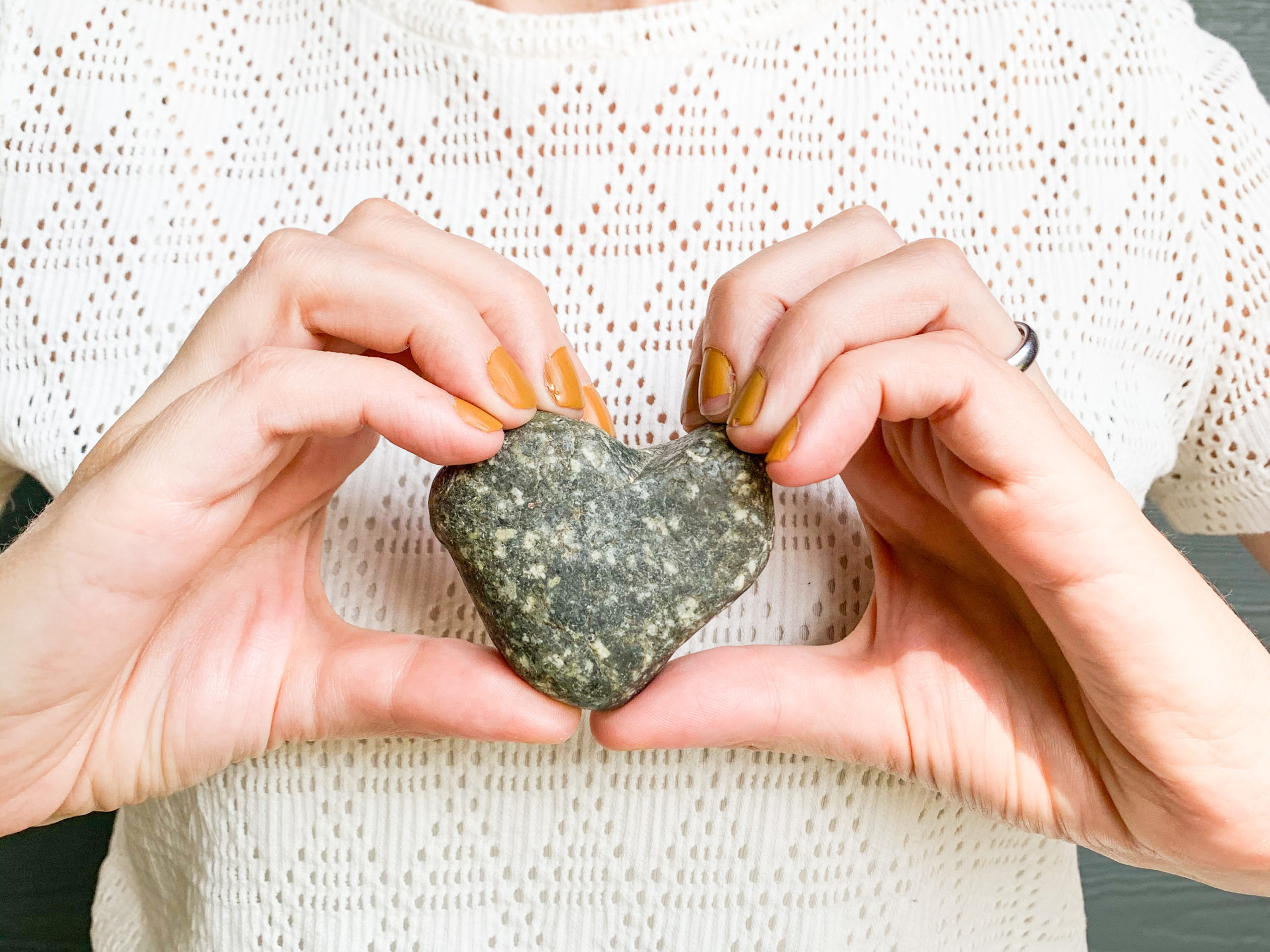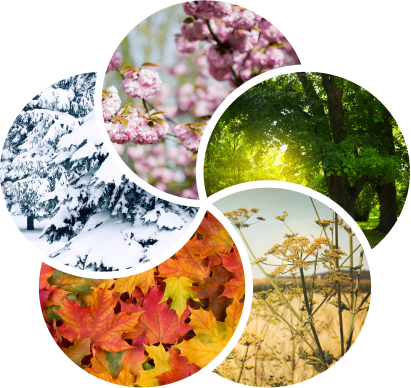In early March before COVID-19 hit the Pacific Northwest hard, my husband and I took a trip to Breitenbush Hot Springs in rural Oregon for some much needed rest and recovery.
The springs were as gloriously relaxing and rejuvenating as you’d imagine.
The land was pristine and so, so quiet.
But I was stressed out about the trip for a full month before we left.
The last time I had visited Breitenbush was 12 years ago at one of the lowest points of my life.
My unhealthy long term relationship had dissolved and I was binge eating and restricting my food as a way to cope with my feelings.
My body dysmorphia went into overdrive, distorting my perception of myself externally as well as internally.
I was in the middle of naturopathic medical school, trying to survive a notoriously difficult winter quarter with barely time to think about life outside of the next exam.
I hated myself on many levels -- I was never good enough, smart enough, fun enough, or just plain enough in any way.
These old scripts of self doubt and deprecation had been running since childhood and at the time it seemed easier to collapse into them and let that old, practiced part of myself run the show rather than to challenge what I’d known for 24 years.
I understood on a visceral level that these scripts were outdated, harmful, and running my life into the ground.
One of the most painful moments in the self-transformation process happens when we become aware that we need to change, but we don’t have the tools, resources, or support to make it happen.
The veil of denial, ignorance, or avoidance has been lifted.
We see clearly that we can’t stay where we are, but we also don’t have a clue where we’re going.
It’s the moment when the rational mind that’s protected you your whole life suddenly can’t work it all out into a neatly wrapped package and you know it. Deeply.
In times of personal transformation, logic cannot rule.
It is limited to the material. The quantifiable. The rational. The visible world of action and reaction.
Personal transformation is a time of the unknown and in the beginning, the depth of the unknown is overwhelming.
I describe it to my patients as feeling like you’re teetering on the edge of a cliff, fearful and wildly uncomfortable.
We have little to no trust in the process of beginning to understand ourselves and our needs in a new way because we’ve never done it before.
There is freedom
waiting for you,
On the breezes of
the sky.
And you ask
“What if I fall?”
Oh but my darling,
What if you fly?
- Erin Hanson
We’ve never had to contend with the unknown so blatantly because our minds have protected us by creating stories to give us answers.
For example when I convinced myself I was never good enough I perversely felt like I had beat everyone else to the punch.
No one else could make me feel quite as bad about myself as I already had so I’d won; I’d protected myself from harm.
But truthfully my negative self talk had silenced my own voice and had allowed me to fall into the false comfort of letting others take the reigns in my life.
My own attempts at protecting myself were truly what kept me stuck and afraid.
I saw this same thought process clearly in a patient of mine who was caught up in an on-again-off-again relationship with a partner who struggled with sex addiction.
They had discussed his infidelity and restarted their relationship based on a commitment to stay monogamous going forward.
Things went well for awhile, then she started seeing the same patterns and signs of emotional distancing and anger from him that she had before.
She wanted badly to be in a comfortable, committed, loving relationship so she rationalized that she was imagining things.
She also knew that he was a devoted member of his church and struggled to understand how someone dedicated to their faith could commit adultery.
Our minds become fearful and reactive to protect us when old patterns are challenged, locking us in repetitive loops of thought and positing hundreds of “what if?” scenarios to try to soothe our anxiety, depression, frustration, or fear.
It doesn’t have the answers and trying to use it as your only tool to cope masks the root of the issue: that your core beliefs about yourself, things you think are unshakably true, are in fact, not.
I thought I was never enough.
My patient realized that she didn’t feel worthy of real love.
She was attracted to and stayed with a partner who superficially offered her a committed relationship, but who couldn’t give her the deep, meaningful connection she longed for because she didn’t actually believe that she deserved it.
Progression through the healing process doesn’t happen in the rational mind because core beliefs are often not rational.
They were formed in childhood to keep us safe and represent our solution to survive at a time in our lives when we were solely dependent on others. In other words, they are commonly based in fear.
Stability, comfort, and renewal of the self is realized by going into our hearts.
When we enter into that realm we begin to follow instinct, intuition, and plunge into mysteries greater than ourselves.
The heart’s innate knowledge about our mental, emotional, and spiritual needs can act as our guiding light.
The heart is patient, compassionate, and curious, and these qualities are what help us to navigate through the unknown before us.
The heart, however, is vulnerable. Reason and logic often act as armor, creating a system where anything can be rationalized away by our egos.
In contrast, the heart lays bare our deepest, authentic selves and asks for acceptance, love, and grace.
There is inherent risk in this posture of humility and openness.
Some might see it as weak.
But there is also great risk in losing ourselves in stories perpetuated by our minds, our families, and our culture if we don’t ground ourselves in the energy of our own identity and connect with the courage to stand solidly within it.
Without connecting to our hearts, we remain in an anxious purgatory, aware we need something different in our lives but not allowing ourselves to make the shift.
We start to feel trapped, isolated, and hopeless.
It’s painful to look back at ourselves when we were so lost.
And I had to own that pain when I returned to Breitenbush this year.
The decade old hurt, uncertainty, and fear resurfaced for me strongly while I was soaking in the tubs watching deer graze peacefully from a few feet away.
In moments like these when our emotions surface it’s crucial that we don’t reject our younger selves and shove them aside with judgment, criticism, and admonishment as we’ve done countless times already.
As we experienced growing up.
As our parents experienced growing up.
As their parents experienced as well.
If we respond in judgment and shame we continue to carry that pain into our lives and perpetrate it upon ourselves, our children, and others in an endless cycle.
Instead we can turn with compassion to our younger selves and give them the support they didn’t have but desperately needed.
We can say, “wow that was so hard.”
“I’m proud of you for doing your best.”
“You did everything you could with the tools you had and you couldn’t have done more.”
We have to allow ourselves to grieve the difficulties we’ve lived and survived, otherwise they will weigh on our hearts forever.
They will show up as patterns of defensiveness and protection any time we feel vulnerable, which is usually around those we love the most.
If we can accept our struggles and who we were at those tender points in our lives, we can finally release our burden and truly start to heal.
We become more whole as we integrate fractured and discarded parts of ourselves.
We can start to believe that we’re worth the time and effort it required to change.
Returning to Breitenbush was an internal olive branch to my younger self.
It was holding the duality of grieving my pain and being grateful for it.
I am not the same person anymore but I would not be the same without her.
The courage and vulnerability it took for her to leap into her heart after living in her mind her whole life is awe-inspiring to me now.
Because she learned to trust in the unfolding of the unknown I am who I am today.
I will forever be grateful for her resilience, gumption, and grace.




